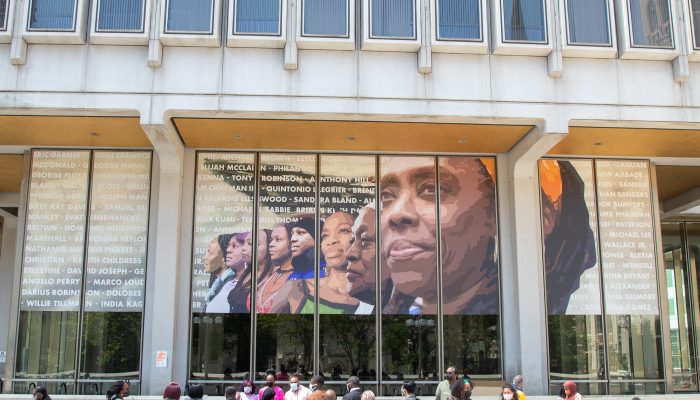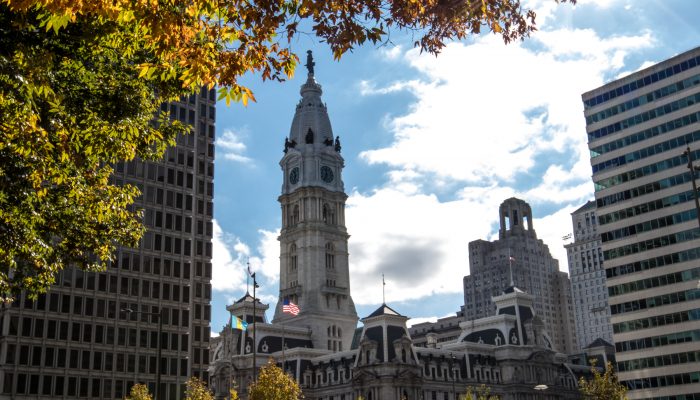On June 15, the City of Philadelphia released a one-year progress report that provided a comprehensive update on the City’s Pathways to Reform, Transformation, and Reconciliation work, marking one year since the group’s formation. The initiative, supported by a diverse Steering Committee, was established in June 2020 as part of the City’s commitment to reform amidst widespread activism around police brutality and racial inequities in the city and across the country.
Over the past year, the City has worked together with institutions, departments, and community leaders, and organizations to enact a meaningful reform agenda, reimagine public safety, and advance racial justice.
Through short-term, mid-term, and long-term objectives, the Steering Committee has focused its work on four key priorities:
- Public sand policing
- Economy
- Community engagement and reconciliation process
- Health
Here are some highlights from the progress we’ve made so far, as well as some notable achievements.
Public safety and policing
Since the launch of the Pathways initiative, City leaders along with Police Commissioner Outlaw’s executive team, the Steering Committee, and the Committee’s police reform working group have worked closely to implement meaningful reforms to better serve and protect Philadelphians. The multi-level agenda currently consists of reforms divided into five main areas:
- Update and review policies.
- Strengthen oversight measures and increase transparency and equity.
- Implement behavioral health and mental-health-related operational reforms in policy and protocol.
- Evaluate budgeting and collective bargaining process.
- Support state-level police reforms.
In the past year, the Philadelphia Police Department has worked on a series of reform efforts in these categories. The Police department has had sizable growth in numbers of Crisis Intervention- and Implicit Bias- trained officers and personnel; ground laying measures in reimagining oversight and disciplinary processes; and substantial growth in its partnership with the Department of Behavioral Services and Intellectual disAbility Services to properly serve the needs of Philadelphians who suffer from mental health and behavioral health-related crises.
Some key numbers that summarize the progress on Public Safety and Policing are:
- The CNA’s after-action report was completed in December 2020 and the final report identified a total of 77 findings with the PPD’s response to city-wide unrest during this time period, and also included recommendations for improvement in each area. PPD accepted all 77 recommendations.
- 26 target reform areas completed or pending in the Pathways initiative.
- 3,214 officers have received the full 40-hour Crisis Intervention Team (CIT) training and certification.
- Nearly 150 virtual PPD-sponsored community meetings, sessions and town halls.
- 2,741 PPD personnel trained in Implicit Bias.
Going forward, the Police Department continues to focus on implementing equitable strategies, including those designed to increase diversity in recruitment, rebuild a foundation of trust and relationships in neighborhoods, and implement tools to increase equity and proactively reduce harm.
Economy
The Pathways to Reform, Transformation,and Reconciliation initiative’s economic efforts have supported:
- The development and implementation of COVID-19 relief programs.
- The allocation of dollars into small and minority-, women-, and disabled-owned businesses (M/W/DSBES).
- Targeted investments in disproportionately impacted neighborhoods and communities through funding and programmatic initiatives.
These efforts, in collaboration with the Steering Committee, Department of Commerce, and Inclusive Economy subcommittee, prioritize reviewing the City’s budget, investing in historically disadvantaged communities, and supporting small businesses against the backdrop of the ongoing COVID-19 pandemic. During the last year:
- $27 million in COVID-19 relief has been distributed by the Department of Commerce to 3,177 businesses; 63 percent of funding was awarded to minority-owned businesses.
- 10,000 PPE kits were distributed to small businesses to help them reopen last summer.
- $271.3 million City contracts awarded to M/W/DSBEs in FY20, a 6.6 percent increase from FY19.
- 30.1 percent of City contracts awarded to M/W/DSBEs in FY20
Looking ahead, with significant new investments for program staff, workforce development, commercial corridor revitalization, and minority business certification in the proposed FY22 budget, the Commerce Department is poised to further advance its equitable recovery agenda in the upcoming year.
Community engagement and reconciliation process
In the last year, the Pathways initiative has worked collaboratively with community partners to foster conversations between institutions and residents to address structural racism and racial inequity in the city. The group also prioritized a review of public landmarks, monuments, and holidays.
Since June 2020, the City’s Pathways to Reform, Transformation, and Reconciliation have hosted and sponsored 21 public events aimed at public safety, police reform, community wellness, community empowerment and reconciliation, with over 2,000 participants in City’s Pathways-sponsored events and over 650 participants in youth-focused events.
In addition to efforts to increase community relations between the PPD and residents, the Steering Committee has prioritized reviewing Philadelphia’s public art and landmarks. The Landmarks and Monuments Review is a public-driven process to ensure that the City of Philadelphia’s values of inclusiveness, integrity, and respect for the diversity of its residents, visitors, and history is reflected in its monuments and public art, as well as in the names of its City-owned landmarks. Approximately 7,000 City-owned assets have been classified in a database created under the Landmarks and Monuments Review.
In addition, the Kenney administration examined and updated City holidays in relation to racial justice. On January 27, 2021, Mayor Jim Kenney signed Executive Order 2-21, which made two changes to the list of City Holidays:
- The City of Philadelphia will once again recognize Juneteenth (June 19) as a holiday
- For the first time, the City holiday celebrated on the second Monday of October will be recognized as Indigenous Peoples’ Day rather than Columbus Day.
These changes will be in place at least through the end of the Kenney administration. The City will also continue to pursue including these changes permanently as part of the Collective Bargaining Agreements with the four municipal worker unions, which expire in 2021.
Finally, the Pathways Steering Committee’s shared findings and recommendations are supporting the Administration as it continues to pursue the racial equity plans laid out in Executive Order 1-20, which Mayor Kenney signed in January 2020.
Executive Order 1-20 announced the Administration’s citywide Racial Equity Strategy, its commitment to embedding racial equity as an explicit governing principle—a lens all City departments and agencies will use to assess how their operations, including policies and procedures, impact all
Philadelphians, including people of color. Under the Executive Order, all City departments will be required, by the end of 2023, to conduct Racial Equity Assessments and create Racial Equity Action Plans. Departments will complete these assessments and action plans in a phased approach, beginning with the first cohort of departments that began in 2020.
Health
The Pathways Steering Committee worked to support the development and implementation of the City’s health reform agenda with a focus on providing an equitable lens to public health in tackling race- and economic-based disparities.
The Philadelphia Department of Public Health (PDPH) has implemented its Coronavirus Interim Racial Equity Plan, focused on eight key strategies for addressing race-based disparities during the pandemic. This plan summarized PDPH’s approach to addressing the disparate impact of COVID-19
on other communities that have also suffered from historic disinvestment and structural inequity including immigrants, people with disabilities, people experiencing homelessness and housing insecurity, and people with criminal justice system involvement.
By working with community organizations and stakeholders to address existing health disparities, the City has ensured that its response to the COVID-19 pandemic was focused on those at the highest risk. During the last year:
- 857,383 Philadelphians have received at least one dose of vaccine, this is 69% of the adult population. (as of 06/14/21)
- 668,710 Philadelphians have been fully vaccinated, this is 54% of the adult population. (as of 06/14/21)
- There are 93 testing sites in Philadelphia in total, along with several mobile and pop-up testing options.
- PMHCC, Inc., in partnership with the Health Department, has been running a Community Testing RFP seeking proposals from qualified organizations to expand the availability of COVID-19 testing, particularly among people who are at high risk for acquiring or transmitting the infection. To date, this RFP has contracted $12,244,205.34 to 16 community testing providers.
- COVID-19 vaccines are available at 280 sites across Philadelphia. All of these sites are free and do not require appointments, identification, or insurance.
- PMHCC, Inc., in partnership with the Health Department, ran a Community Vaccination RFP seeking proposals from qualified organizations to create vaccine access points in geographic areas and communities that are medically underserved. This RFP has contracted $18,084,091.04 to nine community vaccination providers.
In addition to developing and maintaining a suite of the most visited, most interactive web pages in the history of the City’s phila.gov website (more than 17 million page views to phila.gov/covid since March 2020), the Health Department has developed a robust community outreach program in concert with Philly Counts. Philly Counts, as part of their COVID-19 vaccine outreach work, has hosted ten Vaccine Information Champion Training events in four languages, including American Sign Language. These events have trained over 600 Vaccine Information Champions. The Philly Counts program has made more than 78,351 phone calls, sent more than 7,591 text messages, knocked on more than 2,254 doors, and engaged with more than 10,735 Philadelphians.
In the first round of the COVID-19 Prevention & Response Fund, in partnership with the Philanthropy Network Greater Philadelphia, $365,150 have been distributed to 49 organizations in the Greater Philadelphia area. 72 percent of those funds went to an organization with a leader of color. $150,000 was granted to organizations with at least 90 percent BIPOC staff, and $188,000 was granted to organizations with at least 90 percent community-based staff.
Pathways Forward
One year later, the group—along with its three subcommittees in police reform, inclusive economic recovery, and community engagement—continues to routinely evaluate its progress, adapt its target actions and recommendations to meet residents’ shifting needs, and sustains its commitment to transforming Philadelphia through active re-imagination.



